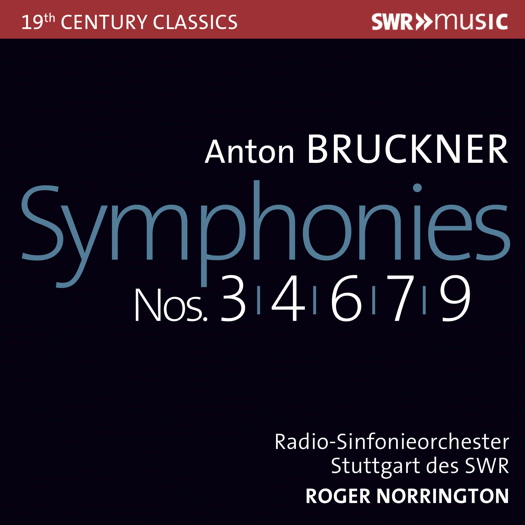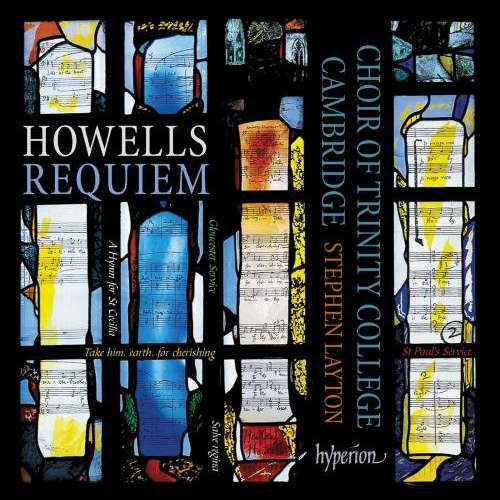- Paul Z Fu
- Kai-Young Chan
- SWR Media Services GmbH
- Ruth Crawford
- Simple Gifts
- Nicky Hunter
- NFM Leopoldinum Orchestra
- Ottawa

Fresh Appraisals
Roger Norrington's interpretations of Bruckner symphonies, heard by GERALD FENECH
'Commendable, if somewhat unorthodox.'
There are few more distinctive conductors than Sir Roger Norrington (born 1934). Known for conducting from a swivelling office chair, his concerts are always energetic affairs, where he talks to the audience and encourages you to clap between movements. Throughout his career he has been famous for bringing fresh perspectives to music by Beethoven, Mozart and Haydn, reinvigorating the approach to performing them on period instruments. Norrington is also credited with making many listeners make a fresh appraisal of works by more recent masters such as Brahms, Bruckner and Mahler.
This set under review, of recordings made between 2007 and 2010, focuses on the Bruckner/Norrington combination. Initially, let us see what Sir Roger has to say on how to interpret Bruckner's colossal scores which, as everyone knows, were subjected to several radical revisions.
As with all our Stuttgart concerts and recordings of 18th and 19th century music, we seek to play our Bruckner symphonies as nearly as we can to how the composer might have expected to hear them. We are a modern orchestra, of course, so one has to keep in mind that instruments were slightly different to 1870, but we use the number of players expected, the Viennese seating plan, the bowing, phrasing and articulation of the period, and the latest information on the tempi of the works. Equally important, of course, is the use of 'pure tone', without the encrustation of 20th century vibrato. The Viennese Philharmonic appeared to have played like this up to 1938. We hope you will be impressed, particularly by the 'heavenly sound' of the slow movements. - Roger Norrington, 2007
Now to the recordings themselves. Norrington's Bruckner approach has a strong sense of unity, the principles being the absence of vibrato, very brisk tempi and an unusual perception to the different editions. The Third and Fourth are the original 1873 and 1874 versions in which Norrington goes against the accepted norm. The Third reveals some of the advantages when vibrato is eliminated.
Listen — Bruckner: Adagio (Symphony No 3)
(CD1 track 2, 0:11-1:09) ℗ 2021 SWR Music :
The limpid clean Adagio opens up some of the finer details of Bruckner's orchestration, and despite the composer being at times wrongly labelled as too church-oriented, many of Bruckner's slow movements do tend to sound that way without vibrato, and the Third's Adagio is a case in point. Indeed, this approach does give one the impression that Bruckner is somewhat too austere and withdrawn. Otherwise, the finale with its mixture of prayer and dance, is much more successful.
In the Fourth, Norrington makes a wholly convincing case, where a pulsating scherzo and a forward driving finale give the symphony a uniquely stirring conclusion flowing with cumulative momentum.
Listen — Bruckner: Finale (Symphony No 4)
(CD2 track 4, 15:51-16:50) ℗ 2021 SWR Music :
The Sixth is permeated by extremely fast tempi, but Norrington still manages to make of the Adagio a profound, noble statement. The Scherzo is managed skilfully, with the details of orchestration all too clearly displayed.
Listen — Bruckner: Scherzo (Symphony No 6)
(CD3 track 3, 1:54-2:47) ℗ 2021 SWR Music :
The finale, with a polka-like tune, is taken at a brisk pace but, despite the risks taken that tended to end the work in an unwanted rush, Norrington still manages to end the piece cohesively and assuredly.
The Seventh came as an unexpected surprise. At a little over fifty-four minutes, my impression is that Norrington was a bit too anxious to get on with things. Maybe the structure and dramatic impetus of the symphony do suffer some consequences, but the conductor's vision to get to Bruckner's destination without frivolous delays works well by the end. Indeed, the finale is an inspiring tour-de-force.
Listen — Bruckner: Finale (Symphony No 7)
(CD4 track 4, 0:00-0:59) ℗ 2021 SWR Music :
And so to the Ninth, where Norrington's interpretation reveals his strengths more than his weaknesses. His attention to detail and the absence of vibrato allow Bruckner's dissonances to be more decipherable.
Listen — Bruckner: Feierlich; misterioso (Symphony No 9)
(CD5 track 1, 21:01-22:01) ℗ 2021 SWR Music :
The coda in the opening movement and the convulsive climax in the finale are particularly arresting. The Scherzo is a shade slower compared to what we are accustomed to but, overall, this Ninth has an expansive quality that does justice to Bruckner's unfinished creation.
Commendable, if somewhat unorthodox.
Copyright © 8 September 2021
Gerald Fenech,
Gzira, Malta

CD INFORMATION - BRUCKNER: SYMPHONIES 3, 4, 6, 7, 9 - NORRINGTON




